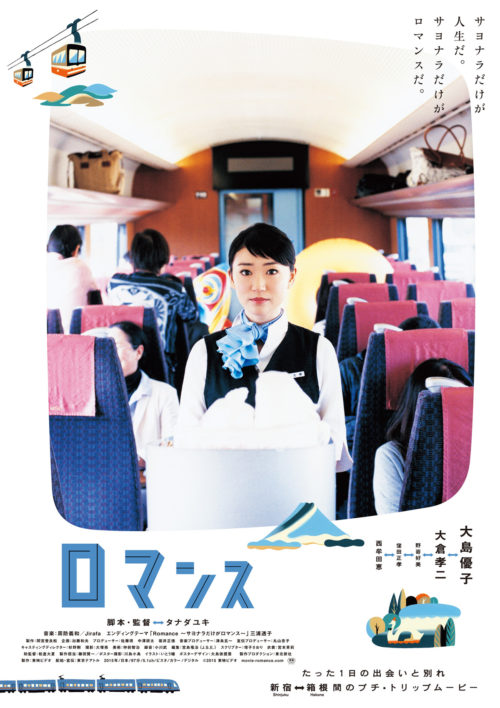
Asian Pop-Up Cinema will close its third season next Sunday, December 4 (4:00pm at the Wilmette Theater), with the movie Round Trip Heart (ロマンス).
For those of you who can read Japanese, you may be curious about the discrepancy between the English and Japanese titles. I like the translation, although I was skeptical at first. The Japanese title, which is the transliteration of “romance,” does a lot more work establishing the setting for Japanese viewers: Hachiko Hoji (played by former AKB48 member Yuko Oshima) is an attendant on the Romancecar train that runs from Shinjuku to Hakone.
She lives a kind of sad life with a loser boyfriend and a loser coworker, but she seems to enjoy her job and does it well, until the day of the movie when she receives a letter from her estranged mother and a passenger named Yoichi Sakuraba (played by the extremely tall Koji Okura) tries to steal a snack from her cart.
The two of them are then wrapped up in a hunt for Hachiko’s mother that takes them all over Hakone, the site of Hachiko’s one family trip before her parents divorced.
The description on the Asian Pop-Up Cinema website calls the movie a romantic comedy, but I’d say it’s closer to a buddy flick. Other than a few coworkers, there are very few speaking roles that aren’t cameos, and the two characters are both linked by a kind of lingering dissatisfaction/depression that they can’t shake. The source of this feeling is very different for each of them, and the film does strong work playing with the audience’s sympathy for the characters. From this point of view, the English title does a lot of work—the viewer’s sympathy may make the round trip voyage.
The Japanese word that came to my mind while watching was 気分転換 (kibuntenkan, change of pace). We learn that Hachiko hasn’t seen her mother since graduating from high school and that Sakuraba is divorced himself and is a failed movie producer. Both could use a day off to run around the touristy sites in Hakone—to check out Odawara Castle, dip their feet in a foot bath, shop for new clothes. But the movie is careful not to fall into a kind of slide show “best of” Hakone. The characters drive the movie here.
My only complaint is that the movie may (or may not??) break the cardinal rule that fiction can begin with a coincidence but not end with one. I liked the way that the ending made me feel, but I can see how some might be disappointed.
And I should say that there is a very delicate touch on the part of director Yuki Tanada, who will be in attendance on Sunday. The final scene with Sakuraba could almost be a throwaway, but there’s a great attention being paid to both Sakuraba and the attention that he is paying. Very nice, and complemented by a long cut, which is technique used throughout the film.
Worth a watch if you have the time and can make it out to Wilmette!
Here’s a trailer if you want to see more. Japanese trailer:
English trailer:
https://vimeo.com/176301432
And here’s a bonus YouTube video of the excellent and very karaoke-able song いい日旅立ち, which features in the movie:
https://youtu.be/Dgv3vNdRVfU


